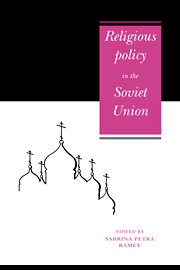Book contents
- Frontmatter
- Contents
- Notes on contributors
- Preface
- Part I Introduction
- Part II Policy apparatus
- Part III Education, socialisation, and values
- 6 Fear no evil: schools and religion in Soviet Russia, 1917–1941
- 7 Soviet schools, atheism and religion
- 8 The Ten Commandments as values in Soviet people's consciousness
- 9 Out of the kitchen, out of the temple: religion, atheism and women in the Soviet Union
- Part IV Cults and sects
- Part V The world of Christianity
- APPENDIX: Religious groups numbering 2,000 or more, in the USSR
- Index
8 - The Ten Commandments as values in Soviet people's consciousness
Published online by Cambridge University Press: 03 December 2009
- Frontmatter
- Contents
- Notes on contributors
- Preface
- Part I Introduction
- Part II Policy apparatus
- Part III Education, socialisation, and values
- 6 Fear no evil: schools and religion in Soviet Russia, 1917–1941
- 7 Soviet schools, atheism and religion
- 8 The Ten Commandments as values in Soviet people's consciousness
- 9 Out of the kitchen, out of the temple: religion, atheism and women in the Soviet Union
- Part IV Cults and sects
- Part V The world of Christianity
- APPENDIX: Religious groups numbering 2,000 or more, in the USSR
- Index
Summary
The uniqueness of the situation
In the last few years, since the beginning of the epoch of perestroika in the former USSR, the problems of human values have been coming to the foreground of discussion and concern. They are also becoming more and more the actual challenges of personal decision and social debate.
The changes people are facing in the former USSR are truly historical. In fact, the post Second World War epoch has never seen such a global collapse of totalitarianism and a genuine ‘geological’ shift in systems of values. The value crisis led to a values' vacuum, and like nature that does not ‘love’ any vacuum, so the social nature does not like an ‘emptiness’ in values systems. The issue of what values will fill the present values vacuum has a momentous impact on the economic and political future in the transforming Russian society, as well as on twenty-first century western civilisation.
There is evidence that the decades of totalitarian control in the Soviet Union perverted basic human values. The savage struggle against religion and any religious ideas, ideals, and spirituality has led to an almost complete elimination in people's consciousness of any frame of moral reference. A type of relativist approach to values has been the substitute: only what benefits political aims is prized. Absolute values have been systematically criticised and profaned – rejected as mere ‘abstract humanism’ in political speeches, in official papers, and in everyday practice.
Numerous and brutal wars in which millions of people were forced to fight and which created tens of millions of victims, and the terror under Stalin that destroyed additional millions of people – these vicious events have depreciated human life, freedom, dignity, and rights.
- Type
- Chapter
- Information
- Religious Policy in the Soviet Union , pp. 187 - 205Publisher: Cambridge University PressPrint publication year: 1992



